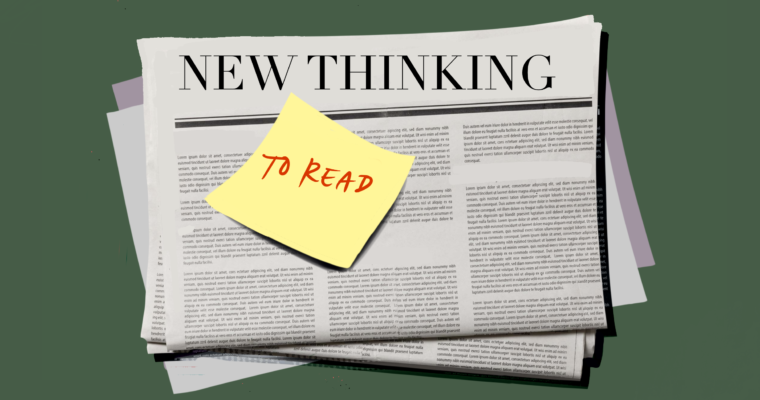Can countries safely print money to combat the crisis? What ethical principles can we rely on in this pandemic? What policy does Soros think the US should implement right away? How does an understanding of gender theory improve our approach to doing economics? This week’s recommended read tackle these themes, and more. Enjoy.
1 | Finding the ‘Common Good’ in a Pandemic in the New York Times, with Michael Sandel
“Think about the two emblematic slogans of the pandemic: “social distancing” and “we’re all in this together.” In ordinary times, these slogans point to competing for ethical principles — setting ourselves apart from one another, and pulling together. As a response to the pandemic, we need both. We need to separate ourselves physically from our friends and co-workers in order to protect everyone, to prevent the virus from spreading. But ethically, these slogans highlight two different approaches to the common good: going it alone, with each of us fending for ourselves, versus hanging together, seeking solidarity. In a highly individualistic society like ours, we don’t do solidarity very well, except in moments of crisis, such as wartime.”
2 | Can We Print Infinite Money to Pause the Economy During the Coronavirus Pandemic? in Vice, featuring David Weil
“What are the consequences of just giving everyone enough cash to survive the next few months? […] It’s complicated.”
3 | With working Americans’ survival at stake, the US is bailing out the richest, in the Guardian, by Morris Pearl and Bill Lazonick
“Amid a humanitarian crisis compounded by mass layoffs and collapsing economic activity, the last course our legislators should be following is the one they appear to be on right now: bailing out shareholders and executives who, while enriching themselves, spent the past decade pushing business corporations to the edge of insolvency.”
4 | George Soros: Guarantee paychecks for all workers displaced by coronavirus to save the economy in the LA Times by George Soros and Eric Beinhocker
“History has shown the strategy works. Thanks to Germany’s “Kurzarbeit” program, unemployment there actually fell from 7.9% to 7% during the Great Recession, while average unemployment in other major developed economies rose by 3%. As a result, the German economy recovered more quickly than those of many other countries.”
5 | The Human-Capital Costs of the Crisis, in Project Syndicate, by Barry Eichengreen
“Unemployment and hardship can also lead to demoralization, depression, and other psychological traumas, lowering affected individuals’ productivity and attractiveness to employers. We saw this in the 1930s, not just in declining rates of labor force participation but also in rising rates of suicide and falling rates of marriage. Here, too, one worries especially about the US, given its relatively limited safety net, its opioid crisis, and its “deaths of despair.”
6 | Ecological and Feminist Economics, an interview with Julie Nelson in Real World Economics Review
“…the mainstream discipline of economics relies on a deeply gendered belief about what makes for good science. Economists like to think of economic life as confined to the market, driven by self-interest and competition, rational and controllable, and intrinsically governed by mathematics and physics-like “laws” not because the economy is intrinsically that way but because these ways of seeing it are all associated with masculinity and toughness. What about production in the home? Care for others and the environment? Human emotions, in the face of a future that is fundamentally unknowable? Ways of understanding that require hands-on investigation and broader sorts of reasoning? Acknowledging these things is, by comparison, seen as womanly and weak. And so those parts of reality and those parts of good science – which I define as open-minded and systematic investigation – were banished.”
Every week, we share a few noteworthy articles that showcase the work of new economic thinkers around the world. Subscribe to receive these shortlists directly to your email inbox.
